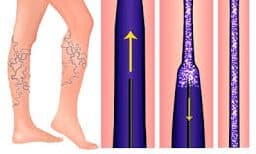Pittsburgh Dr who treats varicose veins with sclerotherapy

Causes Of Spider Veins
Vein injury causes varicose and spider veins. They appear as the tiny, one-way valves inside the veins begin to deteriorate. These valves force blood back toward our hearts in healthy veins. A portion of the blood flows backward and builds up in the vein when these valves become weak. The vein walls are pressed upon by extra blood in the vein.
The walls of the veins become weak and swell under constant strain. Over time, a varicose or spider vein will appear.
Treatment
Treatment starts with a thorough ultrasonic exam called a vein map. Vein mapping will identify the root of your vein disease to accurately target treatment so it will be more than cosmetic. For long term results the underlying cause should be addressed, instead of merely removing the symptom To learn more about sclerotherapy call the professionals at the advanced vein center.
Treating Spider Veins with Sclerotherapy
When using a laser in treating spider veins, the laser is administered from outside of the body. The concentrated light energy from the laser passes through the skin, heating up the blood vessel and eventually destroying it. Different types of lasers that produce light at different wavelengths are carefully selected depending on how deep under the skin the spider veins are located. Each wavelength penetrates the skin at different depths as to target only the veins, leaving the surrounding tissue unaffected. Medical providers also take additional precautions to reduce the likeliness of side effects during the procedure. The skin is kept cool with cooling pads during the procedure in order to avoid pain. This also prevents a mild burn similar to a sunburn from forming. Additionally, the doctor may sometimes apply a topical anesthetic.
Is Sclerotherapy treatment effective for varicose veins?
Sclerotherapy is a commonly used and effective treatment for varicose veins. It is a minimally invasive procedure that involves injecting a solution directly into the affected veins. The solution irritates the vein walls, causing them to collapse and stick together. Over time, the treated veins are absorbed by the body, resulting in improved appearance and reduced symptoms.
Sclerotherapy is most effective for smaller varicose veins and spider veins. It may not be as suitable for larger varicose veins, for which other treatment options like endovenous laser ablation or surgery may be more appropriate.
The success of Sclerotherapy can vary depending on several factors, such as the size and extent of the varicose veins, the skill of the practitioner, and individual factors. Multiple treatment sessions may be required to achieve the desired results, and follow-up sessions may be needed to address any new veins that appear over time.
Most patients experience positive outcomes from Sclerotherapy, including a reduction in the appearance of varicose veins and relief from associated symptoms such as pain, swelling, and discomfort. However, it’s important to note that results can vary, and complete elimination of all veins may not always be possible.
Consulting with a qualified healthcare professional who specializes in vein treatments can provide a more accurate assessment of your specific case and the potential effectiveness of Sclerotherapy as a treatment option for your varicose veins.
How do hormonal changes affect varicose veins?
Hormonal changes can significantly impact the development and severity of varicose veins due to their effects on blood vessels and vein structure. Here’s how:
- Hormonal Fluctuations: Hormones such as estrogen and progesterone can weaken the walls of veins and affect their elasticity, making them more prone to developing varicose veins. This is particularly noticeable during puberty, pregnancy, and menopause.
- Pregnancy: During pregnancy, increased levels of estrogen and progesterone relax the walls of veins, making them more susceptible to varicosities. Additionally, the growing uterus exerts pressure on the veins in the pelvis, further contributing to varicose veins in the legs.
- Menstrual Cycle: Hormonal changes throughout the menstrual cycle can also affect vein health. Some women experience worsening of varicose veins or increased symptoms during certain phases of their cycle due to fluctuating hormone levels.
How can I monitor the progression of my varicose veins over time?
Monitoring the progression of varicose veins involves observing changes in symptoms, appearance, and seeking regular medical evaluations. Here are some steps to effectively monitor your varicose veins:
- Keep a Symptom Diary: Record any changes in symptoms such as pain, swelling, heaviness, or cramping in your legs. Note any factors that might aggravate or alleviate these symptoms.
- Regular Visual Checks: Periodically examine your legs for changes in the appearance of your veins, such as increased bulging, color changes, or new varicose veins developing.
- Use a Photo Journal: Take regular photos of your legs to track visual changes over time. Ensure you use consistent lighting and angles for accurate comparisons.
- Monitor Swelling: Pay attention to any increase in swelling in your legs or ankles, and note if it worsens after prolonged standing or sitting.
- Track Pain Levels: Record any changes in pain or discomfort, including its frequency, intensity, and any associated activities.
When to consider Sclerotherapy?
It may be recommended if you are experiencing symptoms such as pain, swelling, discomfort, or aesthetic concerns due to the appearance of these veins. Sclerotherapy can be considered if conservative measures like compression stockings and lifestyle changes have not provided sufficient relief or improvement. Consulting with a vein specialist or healthcare professional is important to evaluate your specific condition, determine the suitability of sclerotherapy, and discuss potential alternatives if needed.
Most procedures are covered by insurance FREE Vein Screenings Call 724-987-3220 REQUEST A FREE VEIN SCREENING FREE Vein Screenings are available at ALL locations. Vein clinic in Cranberry, Butler vein clinic and our Bridgewater vein clinic to name a few. For directions to our vein offices, visit our Locations page. To find out more about the treatment of veins in Pittsburgh, Call today or fill out our form to schedule a FREE Vein Screening 724.987.3220 Want to learn how to achieve healthy veins?
